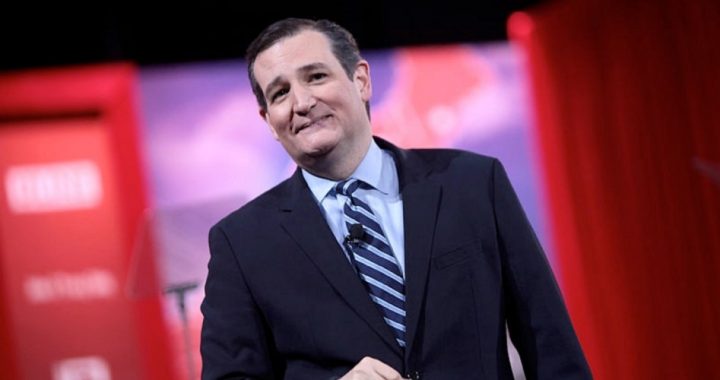
“We do have a real race and we are taking it deadly serious,” Senator Ted Cruz (R-Texas) said over the weekend in reference to his tightening race with Democrat challenger Beto O’Rourke of El Paso. Because of that, there has been increasing speculation that President Donald Trump might hold a rally for Cruz in the Lone Star State.
Two recent polls illustrate the closeness of the contest. The Texas Lyceum Poll has O’Rourke moving to within a mere two percentage points of Cruz, who finished second to Trump in 2016 in a hard-fought battle for the Republican Party presidential nomination. The Quinnipiac Poll, on the other hand, shows a more comfortable lead for Cruz, while still close — the margin here was six points.
As the race moves closer to November, another factor that could ultimately determine the outcome is the financial resources of the two campaigns. Cruz has raised $17.5 million, but O’Rourke has done even better, pulling in $23 million.
Part of the problem for Cruz is that senators who unsuccessfully run for president have historically faced difficulty in getting reelected in their home state. Perhaps their constituents wonder if they really want to continue to “just be a senator” anymore. It also raises their profile considerably, making them a huge target for the opposition.
It is also clear that Democrats are unusually motivated in the 2018 midterms. This is the first midterm with a Republican in the White House since 2006 — and that was the year that the Republicans lost control of Congress after holding both houses for 12 years. While Trump is quite popular with Republicans in Texas, many Democrats inside and outside Texas are expected to take the opportunity to express their dissatisfaction with Trump by voting against high-profile Republicans, such as Cruz.
Cruz’s principal concern is that the anti-Trump voters may be more motivated than pro-Trump voters. “The danger is not a bunch of conservatives voting Democrat,” Cruz explained. “The danger is they stay home.”
Cruz’s past rocky relationship with Trump is another factor in the Texas race. While Cruz’s initial failure to endorse Trump at the Republican National Convention in Cleveland is unlikely to win him any backing from anti-Trumpers, it is feared that lingering effects of the bitterly contested nomination battle could cause some more ardent Trump fans to sit this one out.
But Cruz has an 84-percent approval rating among Texas Republicans — the same as Trump.
And, for the most part, the stance on issues by Cruz and Trump are not that far apart. Since Trump has been president, the relationship between them has thawed considerably. Trump apparently values Cruz’s opinion on judicial candidates. And Cruz has Trump’s ear on other topics. Trump’s pardon of Dinesh D’Souza was reportedly the result of lobbying by Cruz, at D’Souza’s request.
The Houston Chronicle has quoted Cruz as admitting the two have had their “ups and downs,” but he added, “We’re talking to the White House every week, sometimes every day. I’ve been proud to lead the effort to bring Republicans together.”
Why would Trump want to help Cruz, the man who caused him the most trouble in his bid for the presidency?
If Cruz were to lose, it would probably indicate a “Blue Wave,” with Republicans losing the Senate, throwing doubt into whether Trump judicial nominations will be confirmed — including potential Supreme Court vacancies. And a defeat by Cruz, who has a reputation as a strong conservative, could lead other elected Republicans and Republican candidates to take more “moderate” stances.
Cruz’s “Freedom Index” score from The New American (which rates members of Congress on their fidelity to the Constitution) is 79 percent, which is the fifth-highest in the Senate. (Rand Paul of Kentucky and Mike Lee of Utah have the highest scores for the Senate). While this voting record wins him favor from many conservatives across the country, it is a major motivator for Democratic activists and helps explain the huge bankroll amassed by Cruz’s opponent, O’Rourke.
A visit by Trump would help Cruz with those Texas Trump supporters who are still sore about the 2016 nomination battle, but it could also intensify the desire among left-wing activists to defeat Cruz. On balance, however, it is believed that a Trump rally for Cruz would be a positive for the campaign, and perhaps even decisive in a very close race.
Cruz campaign manager Jeff Roe issued a statement on Thursday, directly addressing the possibility of a presidential visit for Cruz: “President Trump has been aggressively campaigning all over the country for Republicans in the midterms. With liberals running all over Texas talking about impeaching the President I would lay odds we may see him again in the next 90 days. Senator Cruz is at the top of the ballot in Texas, so he has talked to the President multiple times one-on-one about how to get conservatives out and vote in November.”
Roe concluded, “We have not placed a formal request for a rally or event but Senator Cruz and President Trump speak often about the political landscape in Texas and how the President can be helpful.”
Cruz himself has said, “I think are likely to see the President down in Texas before the election.”
Photo: Gage Skidmore / Wikimedia Commons



